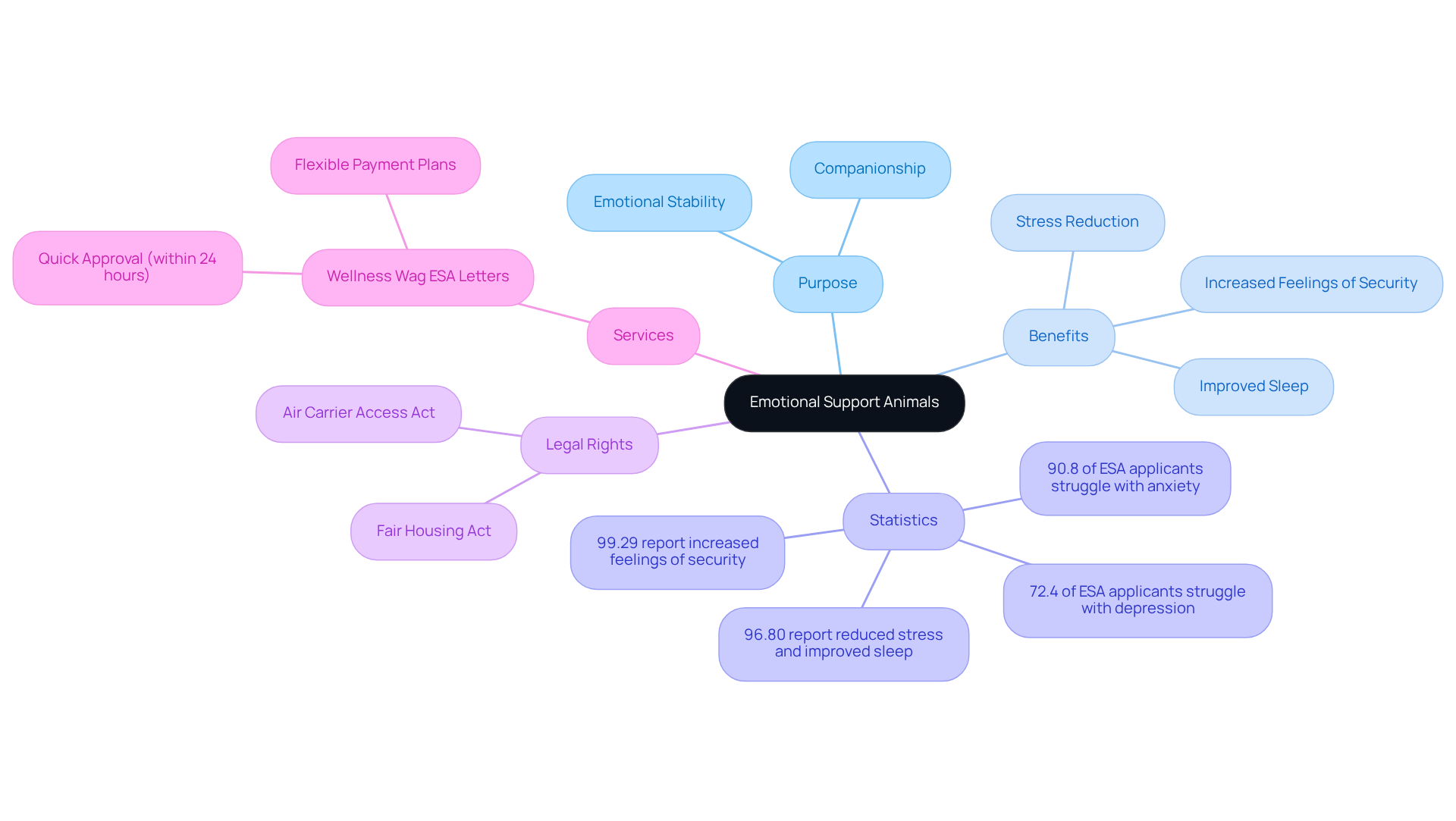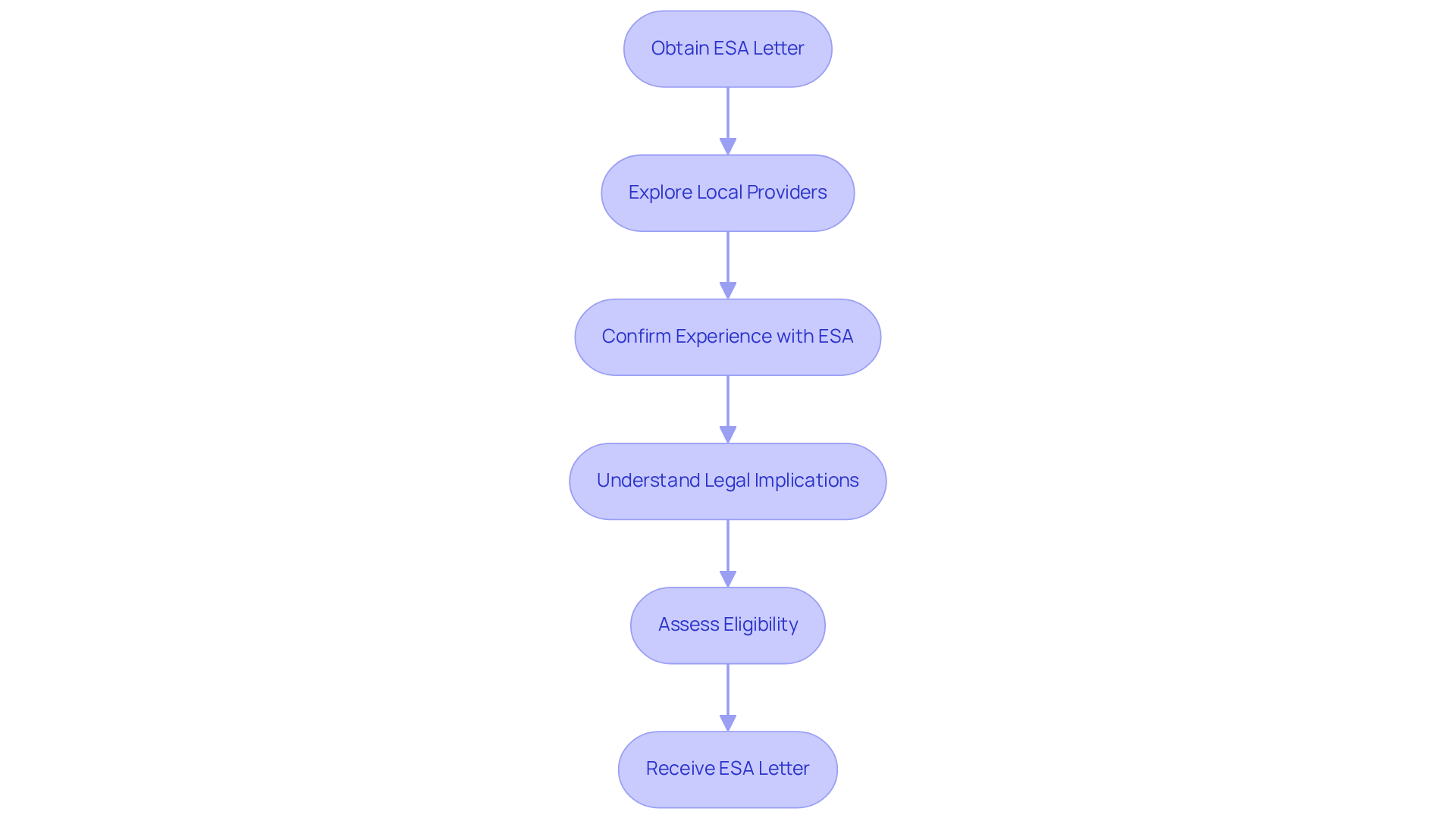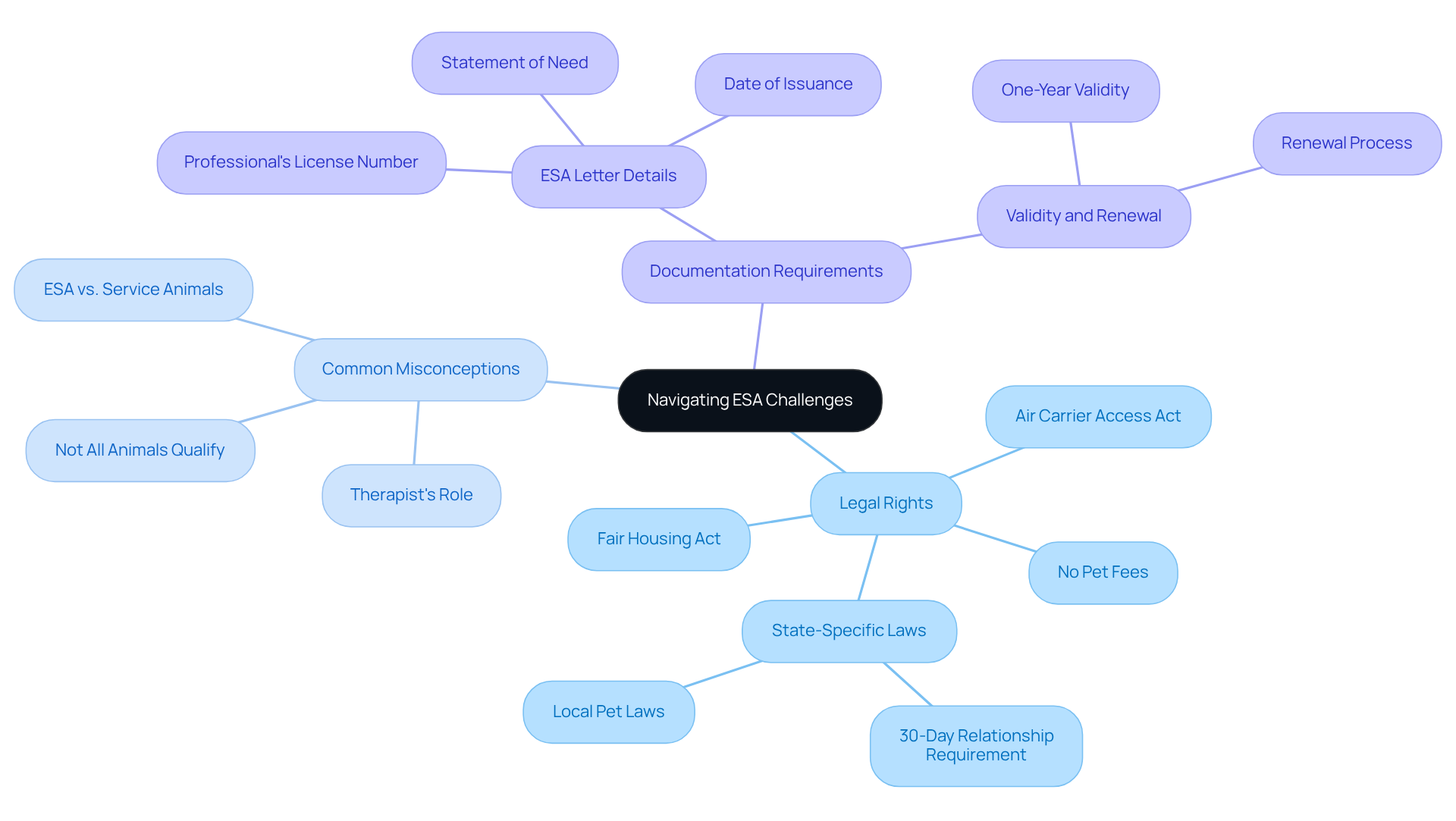

Can a Therapist Write an ESA Letter? Steps to Get Yours
by Lena Park
Last updated: July 15, 2025
Verified and Approved by:
Angela Morris,
MSW, LCSW
Fact Checked

Overview
A therapist can indeed write an Emotional Support Animal (ESA) letter, provided they are a qualified mental health professional who understands the emotional needs of their clients. Many individuals face significant emotional challenges that can feel overwhelming, and having the support of an ESA can make a meaningful difference in their lives.
It’s important to know that licensed psychologists, psychiatrists, or clinical social workers must conduct a thorough assessment to determine eligibility. This process ensures that the ESA letter meets legal requirements for housing and travel under relevant laws, providing reassurance and support to those in need.
Introduction
Emotional Support Animals (ESAs) provide a unique companionship that can profoundly enhance the lives of those grappling with emotional or psychological challenges.
Many individuals face daily struggles that can feel overwhelming, and as our understanding of mental health evolves, the supportive role of ESAs has become increasingly recognized.
This raises important questions:
- Can a therapist write an ESA letter?
- What steps must one take to secure this essential documentation?
Exploring these questions not only highlights the significance of professional guidance on the journey toward emotional well-being but also sheds light on the legal rights and misconceptions that can complicate the process.
It is crucial to understand that the path to obtaining an ESA letter is not just about paperwork; it is about finding the support and comfort that can make a meaningful difference in one’s life.
Understand Emotional Support Animals and Their Purpose
Emotional Support Animals (ESAs) provide essential companionship for individuals navigating emotional or psychological difficulties, offering comfort and assistance that can significantly enhance psychological health. Unlike service animals, which are specifically trained to perform tasks for individuals with disabilities, ESAs primarily deliver companionship and emotional stability. This distinction is vital for those contemplating if can a therapist write an esa letter, as it clarifies the supportive role these animals play in alleviating symptoms associated with conditions such as anxiety, depression, and PTSD.
Many individuals experience profound emotional challenges, feeling isolated in their struggles. Studies reveal that the presence of emotional support animals can lead to remarkable improvements in psychological well-being. For instance, an impressive 99.29% of ESA owners report increased feelings of security, while 96.80% experience reduced stress and improved sleep patterns. Furthermore, nearly 90% of individuals applying for ESA letters face anxiety, and 72.4% grapple with depression, which raises the question: can a therapist write an esa letter to provide the emotional support needed through animal companionship?
Practical examples illustrate the beneficial effects of emotional support animals on well-being. Participants in studies have shared their experiences of enhanced emotional stability and diminished feelings of loneliness, often describing their support animals as lifelines that bridge the gap between mental health challenges and emotional resilience. As our understanding of the advantages of emotional support animals continues to evolve, it becomes increasingly clear that these creatures play a crucial role in fostering emotional health and providing a sense of safety for those in need.
It is also important to recognize the legal rights associated with emotional support animals under the Fair Housing Act and the Air Carrier Access Act. These laws allow individuals to live with their animals in pet-restricted housing and travel with them, emphasizing the significance of emotional support animals in promoting psychological well-being. Wellness Wag facilitates this process by providing valid ESA letters within 24 hours and offering financing options during registration, which leads to the question: can a therapist write an esa letter for clients to begin their journey for as little as $32.25? Testimonials from satisfied customers, like James B., reflect the exceptional service and quick approval they experienced with Wellness Wag, reinforcing the positive impact these letters can have.

Identify Qualified Mental Health Professionals for ESA Letters
A significant step toward enhancing your emotional well-being is obtaining a valid Emotional Support Animal (ESA) letter, and you may wonder, can a therapist write an esa letter, as consulting a qualified psychological expert is essential in this process. This includes licensed psychologists, psychiatrists, or licensed clinical social workers who possess specific expertise in emotional support and therapy.
Begin by exploring local psychological service providers who specialize in emotional support animals, or consider utilizing online listings that connect clients with certified professionals. When selecting a provider, it’s important to confirm their experience with emotional support animals and to understand if they know whether a therapist can write an esa letter and the legal implications involved in issuing one. A qualified professional will conduct a thorough assessment to determine your eligibility and, if approved, can a therapist write an esa letter to provide the necessary documentation. This step is crucial, as only a licensed specialist can a therapist write an esa letter that will be recognized under the Fair Housing Act and Air Carrier Access Act.
Recent trends indicate a growing number of psychological experts are focusing on emotional support animals, reflecting an increased awareness of their healing benefits. For instance, a survey revealed that 32% of pet owners have designated their pets as ESAs, with many seeking these letters following the pandemic due to heightened emotional challenges.
To find qualified specialists, consider reaching out to local wellness clinics or searching for therapists who can a therapist write an esa letter in their practice. Additionally, platforms like Wellness Wag can connect you with licensed medical professionals who facilitate the ESA letter process efficiently, ensuring compliance with legal standards and timely delivery of documentation.
Remember, you are not alone in this journey, and there is support available to help you navigate the process of obtaining an ESA letter.

Approach Your Therapist: Steps to Request an ESA Letter
When preparing to approach your therapist, you may want to consider if a therapist can write an ESA letter, as thoughtful preparation is essential. It’s important to take steps that will ensure a productive discussion, especially when addressing your emotional needs.
-
Schedule a Dedicated Appointment: Choose a time when you can discuss your needs without feeling rushed. This allows for an in-depth conversation that can truly reflect your feelings and experiences.
-
Prepare Your Case: Consider the beneficial effect your emotional support animal has had on your psychological well-being. Reflect on specific instances where your pet has helped alleviate symptoms of anxiety, depression, or other conditions. Emotional Support Animals provide comfort to individuals with disabilities, promoting emotional stability and enhancing overall well-being. How has your pet made a difference in your life?
-
Express Your Needs Clearly: Clearly articulate your belief in the benefits of having an ESA. Share your psychological struggles and how your pet offers crucial support, highlighting the emotional stability they provide. As Jonalyn Dionio states, ‘Emotional support animals (ESAs) assist individuals with psychological or emotional disabilities, leading to the question of can a therapist write an ESA letter?’
-
Ask about the process: Inquire if a therapist can write an ESA letter and what evaluation steps they will undertake regarding your request, as well as what documentation you can expect if approved. Understanding the process can help you feel more at ease. Knowing that Wellness Wag offers a professional and effortless application process can also provide reassurance about the support you will receive.
-
Be Open to Feedback: Your therapist may have questions or suggestions regarding your request. Being open to their perspectives is essential, as they are there to assist your emotional well-being journey.
By following these steps, you can effectively communicate your needs and significantly enhance your chances of obtaining an ESA letter. Moreover, a case study on the effects of Emotional Support Animals on psychological well-being demonstrates that they play a crucial role in easing conditions such as anxiety and depression, further highlighting their significance. As Linda S. shared, “Applying for an ESA through Wellness Wag was the best decision I made. It was an effortless process, and the professional team was there to guide me through every step.

Navigate Challenges: Legal Considerations and Common Misconceptions
Navigating the journey to obtain an ESA letter can feel overwhelming, especially when considering the emotional challenges many face. Understanding your legal rights and addressing common misconceptions is essential in this process, particularly regarding whether a therapist can write an ESA letter, and we’re here to support you every step of the way.
Legal Rights:
The Fair Housing Act is designed to protect individuals like you, granting the right to live with your emotional support animal in housing that typically prohibits pets. Additionally, the Air Carrier Access Act ensures that you can travel with your emotional support animal on airlines, providing you with broader access to the assistance you need.
Common Misconceptions:
It’s important to clarify that not just any animal can be classified as an ESA, nor can an ESA letter be issued without a psychological assessment. To determine if a licensed mental health professional can write an ESA letter, they must assess your specific needs to ensure your animal truly provides the emotional support you require.
Documentation Requirements:
Your ESA letter must include specific details, such as the professional’s license number, the date it was issued, and a clear statement affirming your need for an emotional support animal. This documentation is vital for legal recognition and to safeguard your rights under housing and travel regulations.
By understanding these legal aspects and addressing misconceptions, you can confidently advocate for your rights. Remember, you are not alone in this journey; support is available, and your emotional well-being is important.

Conclusion
Emotional Support Animals (ESAs) play a crucial role in enhancing the emotional well-being of individuals grappling with psychological challenges. It’s important to recognize the significance of these animals and understand the process of obtaining an ESA letter, especially for those in need of support. While a therapist can provide the necessary documentation, it’s essential to approach this process thoughtfully to ensure it is both effective and compliant with legal standards.
Many individuals face emotional hurdles that can feel overwhelming. The companionship of an ESA can offer a sense of comfort and stability, helping to alleviate feelings of anxiety and loneliness. Throughout this article, we explored the importance of ESAs, the qualifications of mental health professionals who can issue ESA letters, and the steps to take when approaching a therapist for this vital support. We also highlighted the legal rights associated with ESAs under the Fair Housing Act and the Air Carrier Access Act, underscoring the necessity of having a valid ESA letter for those who benefit from the companionship of their animals. Additionally, we addressed common misconceptions and clarified the documentation requirements, which are essential in navigating this journey.
Ultimately, the message is clear: emotional support animals are instrumental in fostering psychological resilience and stability. For those considering this path, it is vital to seek qualified mental health professionals and engage in open conversations with therapists about the advantages of having an ESA. By taking these meaningful steps, individuals can advocate for their emotional needs and secure the support they deserve, paving the way for a healthier, more fulfilling life alongside their beloved companions. Remember, you are not alone in this journey, and the support you seek is within reach.
Frequently Asked Questions
What is the purpose of Emotional Support Animals (ESAs)?
Emotional Support Animals provide companionship and emotional stability for individuals facing emotional or psychological difficulties, enhancing their psychological health.
How do ESAs differ from service animals?
Unlike service animals, which are specifically trained to perform tasks for individuals with disabilities, ESAs primarily offer companionship and emotional support rather than performing specific tasks.
What psychological conditions can ESAs help alleviate?
ESAs can help alleviate symptoms associated with conditions such as anxiety, depression, and PTSD.
What percentage of ESA owners report feeling increased security?
An impressive 99.29% of ESA owners report increased feelings of security.
How do ESAs impact stress and sleep patterns?
Approximately 96.80% of ESA owners experience reduced stress and improved sleep patterns due to the presence of their emotional support animals.
Can a therapist write an ESA letter?
Yes, therapists can write ESA letters to provide the emotional support needed through animal companionship.
What legal rights do individuals with ESAs have?
Under the Fair Housing Act and the Air Carrier Access Act, individuals with ESAs have the right to live with their animals in pet-restricted housing and to travel with them.
How quickly can one obtain a valid ESA letter through Wellness Wag?
Wellness Wag provides valid ESA letters within 24 hours.
What are the financial options available for obtaining an ESA letter through Wellness Wag?
Wellness Wag offers financing options during registration, allowing clients to begin their journey for as little as $32.25.
What do testimonials say about Wellness Wag’s service?
Testimonials from satisfied customers, such as James B., highlight the exceptional service and quick approval they experienced with Wellness Wag.
Certify Your Emotional Support Animal Today

Why You Can Rely on Us?
At Wellness Wag, we believe your pet deserves care rooted in both science and compassion. Each article is carefully researched, written in clear language for pet owners, and then reviewed by qualified professionals to ensure the information is evidence-based, current, and practical for real-life care. Our goal is to help you feel confident in making informed decisions about your pet’s health and well-being.
Reviewed by
Angela Morris, MSW, LCSW
Angela is a licensed clinical social worker with 20 years of experience in patient advocacy and community mental health. She has assisted numerous clients with ESA evaluations and brings a deep understanding of disability accommodations, ensuring that all information is accurate, supportive, and practical.

Written by :
Lena Park
Last Updated :
July 15, 2025









